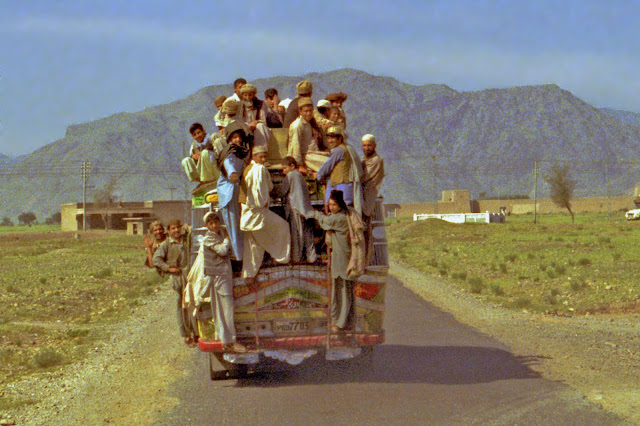 |
| The Khyber Bus |
Day 27 Sat 21 June PESHAWAR
Departure time: 7.30 Tach reading: 135,878 Distance run: 193 kms
Today, a guide – Mr Khalid Sultan – will take us on a morning excursion up the famed Khyber Pass. The Pass proper begins around 10 miles out of Peshawar and shortly before that, we enter tribal territory which has its own code of laws, outside the jurisdiction of normal Pakistani law.
 |
| Street scene in Jamrud, entrance to the Khyber Pass |
 |
| Tribesmen waiting for the bus, Jamrud |
At the small town of Jamrud, we pass through the gate that marks the entrance to the Khyber Pass, which has seen so much conflict over the centuries. This, then, is the home of the Afridi Pathans, one of the most feared of the Pashto-speaking peoples who inhabit the North-West Frontier. The strategic importance of the Khyber Pass stems from the fact that it is the easiest outlet onto the plains of India from the mountains of the Hindu Kush, the Afghan plateau and Central Asia and as such, it has seen the passage of the great invading armies such as the Persians of Darius the Great, the Macedonian and Greek army of Alexander the Great, the Tartars of Tamerlane, Babur’s Moghuls and many more. Only two armies have marched the opposite way through the Khyber Pass. These were the Mauryans under Ashoka in the 3rd century BC, and the British relief expedition to Jalalabad in 1842. Khalid will tell us how the British force of 16,500 were ambushed in the Pass and only a single survivor – Dr Brydon reached Jalalabad, however Khalid is telling the story from local tradition. These events did take place and the tribesmen did annihilate a British Army, led by the incompetent General William Elphinstone, in 1842, but the main events happened further north, between Kabul and Jalalabad. The British relief expedition managed to curtail any Pathan attacks in the Khyber Pass. The British expedition had originally entered Afghanistan in 1839 via the Bolan Pass, near Quetta, capturing Kandahar and Ghazni on the way. This was the same route taken by Alexander the Great in 330 BC.
 |
| Tea service provided on the bus through the Khyber Pass |
The modern road which, for much of the way, follows alongside the old Moghul Silk Road built by Akbar, was constructed by the British in the 1920s, as was the Khyber Railway, a marvel of engineering, along which the Pakistanis maintain a once-weekly service from Peshawar to the smugglers’ haven of Landi Kotal. (this weekly service ceased in 1982).
 |
| Landi Kotal station with the Khyber train |
 |
| Pathan boys at the Landi Kotal Station |
We will stop several times on the road for photographs. Khalid will take us to a smuggler’s house – or fortress – in the Pass which will be an interesting experience, and we will also be stopping in Landi Kotal to look around the market place – you may see kilo-blocks of hashish stacked in the street! Even time for a local burger - far tastier than McDonalds! We will go as far as the Afghan border at Torkham, where you will be able to put a foot inside war-torn Afghanistan, just over the Durand Line, before returning back down the Pass to Peshawar.
 |
| A 'smugglers' village & the smuggler's family, Khyber Pass |
 |
| The streets of Landi Kotal & a local burger chef. |
This afternoon we will visit another Afridi village in the Suleiman Mountains known as Darra Adam Khel, better known as the ‘Gun Village’. Here, in factories in the village, all types of firearms – rifles, pistols, shotguns, machine-guns – both light & heavy – hand grenades, even pen-guns (metal-cased ballpoints – remove the refill, pull out the end-knob to fire!), are manufactured. Many are copies of well-known Western brands – Lee Enfields, Lugers, Mausers, Astras, and Russian Kalashnikovs, captured in Afghanistan, are starting to make an appearance. At the moment, quite a business is being conducted with the Afghan tribesmen who come here to buy weapons to take back to the hills to fight the Russians. We should be back in Peshawar around 7pm.
 |
| The Gun-makers village of Darra Adam Khel, near Peshawar |
 |
| Crafting the stocks of a Lee Enfield replica, Darra Adam Khel |
 |
| Crafting the breeches & machine-guns in the street, Darra Adam Khel |
Most of you were interested in the stop at the Afghan Refugee camp, but only a few of you heard the message that was passed on to us by the Afghan elders. One venerable old man was, in particular, quite vocal and the general gist of his message to us was as follows:
 |
| Afghan children, first refugee camp, Peshawar, 1980 |
“We are not afraid of the Russian or his tanks, we can fight them. What we are afraid of is the MiG, the aircraft. They destroy our villages, kill our women and children and we cannot do anything. We don’t want money from you, you people are Ambassadors from your countries; please, please on behalf of our people, make our plight known to your governments, make them understand that we need only anti-aircraft weapons, nothing else. With them we can fight back. Today, we fight the Russians, tomorrow it will be you!”
I have always been uneasy with the ambiguity of this last sentence. Did it mean that if the Afghans didn’t beat the Russians, we would be fighting the Russians in the future, or did it mean the Afghans would be fighting us (the Americans & their Coalition - as it came to pass)?
Pax Comment:
text & photographs ©Neil Rawlins |


No comments:
Post a Comment